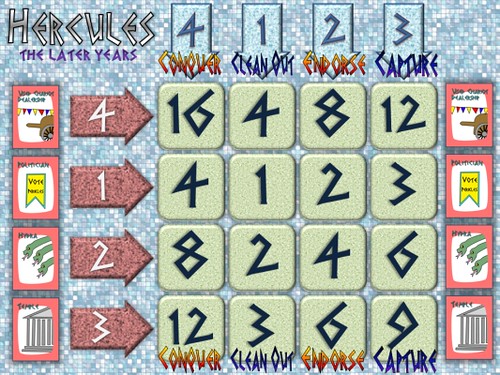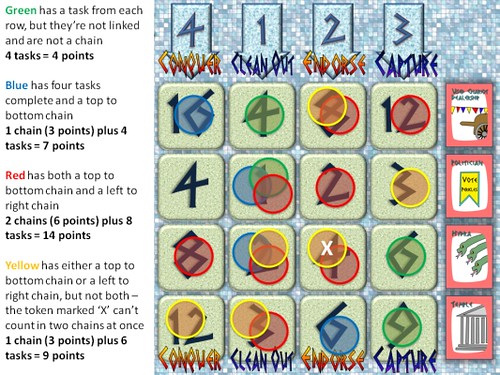Hercules: The Later Years

Story:
After his labors, Hercules rested on his laurels. Literally – he had a whole pile of laurels upon which to rest. But over time, his fame faded, and he’s now badly in need of drachmas to support his lavish demigod lifestyle. You are Hercules’ new agent, trying to find him some paying gigs that fit his skillset.
Parts:
- 108 cards
- Starter pawn
- Game Board
- 30 coins per player

Setup:
Give each player 10 coins. Place the other coins in reserve. Place the game board in the center of the table. Shuffle the cards and place them in a pile face down. The player most likely to have been sired by Zeus takes the starter pawn.
Turns:
Each turn has two phases described below.
Phase I: Card Auction
Draw one card from the deck per player in the game. All but one of these should be placed face up; the last should be face down and hidden from all players. So, if there are four players, turn three cards face up and place the fourth face down. These are the cards up for bid.
The player with the starter pawn bids first by placing as many coins as she wishes on top of one of the cards. Only one bid may be placed at a time, and a player may not refuse to bid. Bidding progresses around the table to the left. Each subsequent player may either bid on an unbid card or add coins to an already-bid card. For example, if Andromeda bids two coins on a Conquer card, and Antigone adds a coin to that card, Antigone’s total bid is three coins, and Andromeda’s bid is no longer valid.
Bidding continues until each card is allocated to a player. Players cannot change their bid amounts or switch cards unless outbid. When outbid, a player may request that her coins be refunded and replaced by the higher bidder.
When bids are resolved, each player must pay the total amount they bid to collect their card. Unused coins are returned to their owners.
Deadbeat Rule: If a player bids more coins than she has, the auction is cancelled and then repeated without the deadbeat player participating. The extra unbid card is discarded.
Phase II: Playing Cards
Beginning with the starting player and moving left, players may play their cards as follows:
Draw Cards: The player discards the draw card and takes the indicated number of new cards.
Object and Action cards: If a player has both an action (Conquer, Capture, Clean Out, Endorse) and an object (Used Chariot Dealership, Temple, Hydra, Politician), she may play them to make Hercules complete a task. The player discards the cards, takes a new coin of her color from the reserve, and places it on the game board at the appropriate spot for the action and the object.
Fees: Each action and object has a value associated with it. To determine the fee paid for the task, multiply the cards. For example, Capture has value 3 and Temple has value 2, so capturing the temple is worth 3x2=6 coins. A player who captures the temple collects a fee of 6 coins. Fees are printed on the board task spaces.
Repeating a task: The first time a task is completed, it requires only one action and one object card. Each subsequent time, the task costs one more of each. For example, the second time someone endorses a politician, it takes two Endorse cards and two Politician cards. The fee remains the same regardless of how often the task is completed. The player’s coin is placed on the board on top of any previous coins. Players may repeat tasks they’ve completed.
Bonus cards: Some action and object cards are marked double or triple. This means that they may count as more than one card when completing a task. The fee paid for the task remains the same. Players may “overpay” for a task.
Players may make as many plays as they wish. When all players have had one chance to play cards, the starter pawn goes to the next player, and a new Card Auction phase begins.
Victory:
The game ends when there are not enough cards in the deck for a full card auction. At that point, the game is scored as follows:
- Each task completed – 1 point.
- Most unspent coins – 2 points.
- Each chain of coins across the board – 3 points. A chain is any unbroken string of coins which connects opposite sides of the board. The coins in a chain must be adjacent. Each individual coin may only be used in one chain.

The highest scoring player wins. For tiebreakers, use the most unspent coins and then the most unplayed cards.















No comments:
Post a Comment